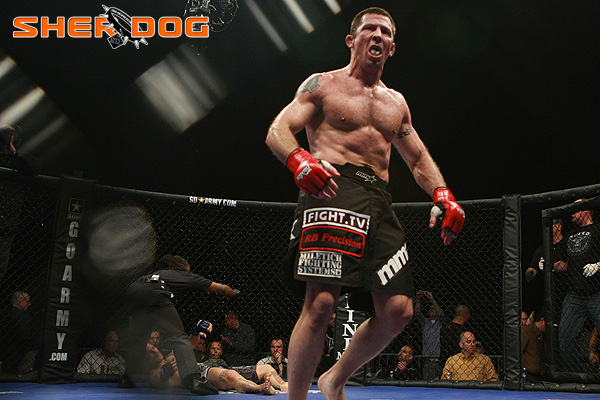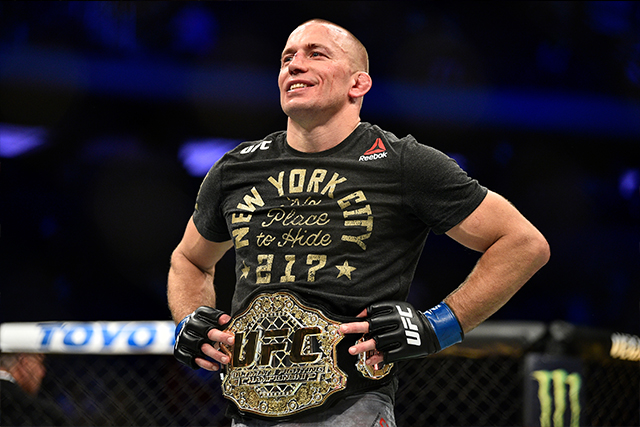The UFC Flyweight Title and the History of Championship Introductions
The Little Guys

Silva is now one of the UFC’s top stars, and his title bouts with Chael Sonnen and Belfort have been among the promotion’s biggest fights in 2011 and 2012. It took even the greatest fighter in the world a few years, but Silva turned the UFC middleweight title into one of the sport’s richest prizes.
UFC Welterweight Title, Est. 1998
Initially labeled the lightweight title, the UFC’s 170-pound crown has gone through three distinct stages, each more successful than the last. First, with Pat Miletich as champion, the title was something of a UFC black sheep. Under Hughes, it was a prestigious championship but one that did not resonate outside the UFC’s core audience. Finally, Georges St. Pierre reigned as arguably the sport’s most popular star, and the welterweight title became one of MMA’s most coveted and intensely followed prizes.
Advertisement
That changed under the title run of Hughes. He captured the belt by avenging his mentor, Miletich, and defeating Newton at UFC 34. Hughes proceeded to dominate his division with wins over the likes of Hayato Sakurai, Frank Trigg, Sean Sherk and St. Pierre. During this time, he cemented a reputation as one of the best fighters in the history of the sport. However, as was the case with Silva, Hughes’ fights did not mean big box office business. He often headlined shows, but they did worse than events with heavyweights and light heavyweights on the marquee.
Just as Silva benefitted from a fight with Griffin years later,
Hughes profited from an encounter with the legendary Royce Gracie.
Gracie’s return to the UFC for a non-title fight with Hughes drew a
then record buy rate. When Hughes easily disposed of Gracie, it
elevated his standing and the prestige of the title. His next two
fights against Penn and St. Pierre did solid business, and the
welterweight championship was finally established at a top level
eight years into its existence.
The welterweight title rose to even higher heights under St. Pierre. More than any other fighter currently in the sport, he is able to generate a lofty level of interest against any opponent. Fans simply want to see St. Pierre defend his throne.
UFC Lightweight Title, Est. 2001
Sherdog.com
Miletich was the first to wear
UFC welterweight gold.
The 155-pound strap has traveled a rocky path, much like the early history of the UFC heavyweight title. Jens Pulver was the first champion but left the promotion without dropping the belt. A tournament was held to crown a new champion, but after a draw in the final, the UFC simply gave up on the idea for years. In 2006, it was re-established, only to have Sherk stripped of the title over a failed drug test. Five years into its existence, the lightweight belt had gained no traction whatsoever.
Penn quickly breathed life into a moribund division. His title fight with Sean Sherk, buttressed by strong undercard help, did a healthy 475,000 buys -- in the same ballpark as light heavyweight and welterweight title bouts from the same period. That set up a champion-versus-champion showdown with St. Pierre.
One might have figured that a decisive Penn loss to GSP might have hurt the prestige of the lightweight division. In fact, the opposite occurred. Penn’s matchups with Kenny Florian and Diego Sanchez were smashing successes, and his fights with Frankie Edgar did well, too.
Unfortunately, the lightweight championship simply has not generated wide interest since Edgar won it from Penn at UFC 112. The division is the best in the sport and hardcore fans love the quality of the competition, but no title fights since then have done even average business. That is likely to turn around at some point given the quality of the fighters, but, right now, the lightweight division needs Penn more than the Hawaiian needs it.
UFC Featherweight Title, Est. 2011
The featherweight championship will serve as an interesting test of the meaning of UFC titles now that the company has expanded from five titles to eight. Jose Aldo has dominated the division and has an exciting style, but, like Hughes and Silva before him, he has yet to develop into a box office attraction.
Aldo’s path to superstardom may prove trickier with an increased volume of shows and number of champions. He just is not the focus of attention and thus needs to consistently deliver spectacular performances. He also has the added difficulty of needing to convince people to spend $50 to $60 to see him defend his title when those fights have been free in the past few years.
Ultimately, the prestige of the featherweight title will rest on the ability to find captivating rivals for Aldo. The right opponent has not come along yet. It could come in the near future, but, as we have seen with other divisions, it could also take years.
UFC Bantamweight Title, Est. 2011
The UFC’s bantamweight championship is in much the same position as its featherweight counterpart, waiting for the right fights to catch fire.
Urijah Faber had the potential to be a difference maker and was the WEC’s top attraction, but he lost five straight title fights; “The California Kid” is now long past the point where the UFC can rush him into another quick championship bout. Between Dominick Cruz, Renan “Barao” Pegado and Michael McDonald, the UFC has some excellent young fighters at 135 pounds, but it remains to be seen whether or not they will turn bantamweight title fights into something MMA fans mark down on their calendars.
UFC Flyweight Title, Est. 2012
That leads into the UFC’s newest edition. The hope is that creating a new title will make smaller fighters like Johnson and Benavidez feel more important by fighting for promotional gold. However, the reality is it has usually taken a star to make a title, and neither Johnson nor Benavidez has obvious star qualities. They have not generated fan followings despite being amongst the best 135-pound fighters in the world. It is likely going to take someone else to elevate the championship to a higher level.
An additional question is the inherent marketability of 125-pound fighters. Smaller fighters have drawn in boxing and MMA, but the very smallest divisions in boxing have never really caught on. There may be a size where a title will not mean much to the general public, no matter how charismatic, competitive and exciting the fighters may be.
The flyweight title clearly will not take the path of the one at light heavyweight, and it will not be one of the UFC’s marquee championships immediately. Whether it follows the incremental growth of the welterweight title or the turbulent road of the lightweight belt remains to be seen. Benavidez or Johnson will soon be champion. The greater story lies ahead.
Related Articles







